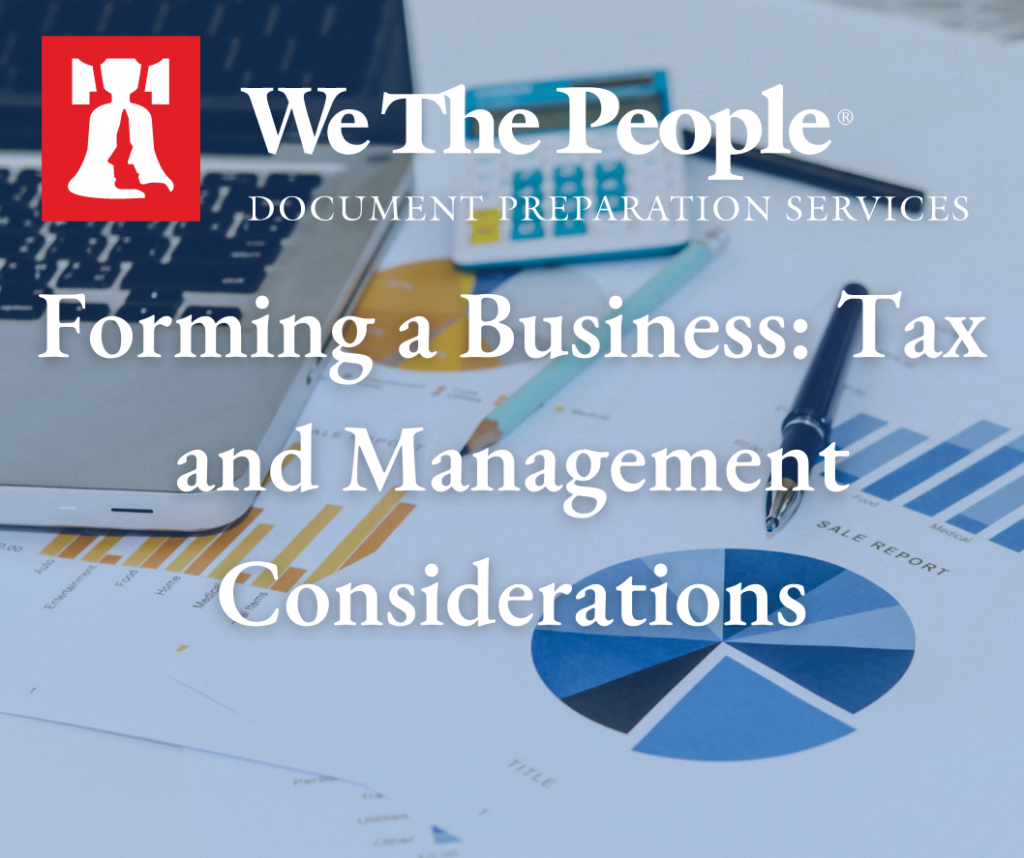 Forming a Business: Tax and Management Considerations
Forming a Business: Tax and Management Considerations
When setting up a business, one of the earliest and most critical decisions is determining the type of business structure you’ll adopt. This choice not only affects how your business operates but also shapes its tax responsibilities and management style. In this guide, we’ll break down the key things to think about when forming your business, focusing on different business structures, their tax implications, and how they impact how your business is managed.
Understanding Business Structures: A Brief Overview
Before diving into the details of taxes and management, the following is a brief overview of the main types of business structures:
- Sole Proprietorship:
- Management: You run everything.
- Taxes: Your business income is included in your personal tax return.
- Partnership:
- Management: You share responsibilities with partners.
- Taxes: Partners report their share of income on their personal tax returns.
- Limited Liability Company (LLC):
- Management: Management is flexible, based on your agreement.
- Taxes: You can choose how you want to be taxed: as a sole proprietorship, partnership, or corporation.
- Corporation (C-Corp or S-Corp):
- Management: A board of directors oversees things; shareholders own through shares.
- Taxes: C-Corps face double taxation; S-Corps pass profits through to shareholders’ personal tax returns.
- Nonprofit Corporation:
- Management: Guided by members or a board; focused on a mission.
- Taxes: Can get tax-exempt status if you meet specific requirements.
Considering Taxes:
- Tax Efficiency:
- Sole Proprietorship/Partnership: Simple taxation but self-employment taxes apply.
- LLC: Flexible taxation options.
- Corporations: Different tax implications for C-Corps and S-Corps.
- Self-Employment Taxes:
- Sole Proprietorship/Partnership: Full self-employment taxes.
- LLC: Self-employment taxes unless you choose to be taxed as a corporation.
- Corporations: Employees pay payroll taxes; shareholder dividends aren’t subject to self-employment taxes.
Managing Your Business:
- Control and Decision-Making:
- Sole Proprietorship: You’re in charge.
- Partnership: Decisions shared among partners.
- LLC: Management structure defined in the agreement.
- Corporations: Directors make big decisions; shareholders vote on key matters.
- Ownership and Equity Distribution:
- Partnership/LLC: Ownership divided among partners/members.
- Corporations: Ownership through shares of stock.
- Complexity and Compliance:
- Sole Proprietorship/Partnership: Few requirements; less compliance.
- LLC/Corporations: More administrative work and reporting.
Choosing the Best Fit: Factors to Consider:
- Goals:
- Define your business goals.
- Liability Protection:
- Consider how much personal risk you’re willing to take.
- Tax Strategy:
- Think about the tax benefits that suit you.
- Ownership and Management Vision:
- Decide how you want to manage and grow.
- Future Flexibility:
- Consider how easy it is to change your structure later.
Picking the right business structure is pivotal. It determines how you manage, pay taxes, and grow your business. By weighing tax implications and management styles, you’re setting your business on a sturdy foundation for success.
Embarking on your business venture? At We The People, our experienced team of paralegals prepare tailored documents for any structure. From LLCs to corporations, we’ve got you covered. Contact our team to get started today.
Disclaimer: This content is for informational purposes only and should not be considered legal advice. Consult with a licensed and qualified attorney for advice specific to your situation.
This text is property of We The People® and may not be copied, printed, or distributed in any fashion.

